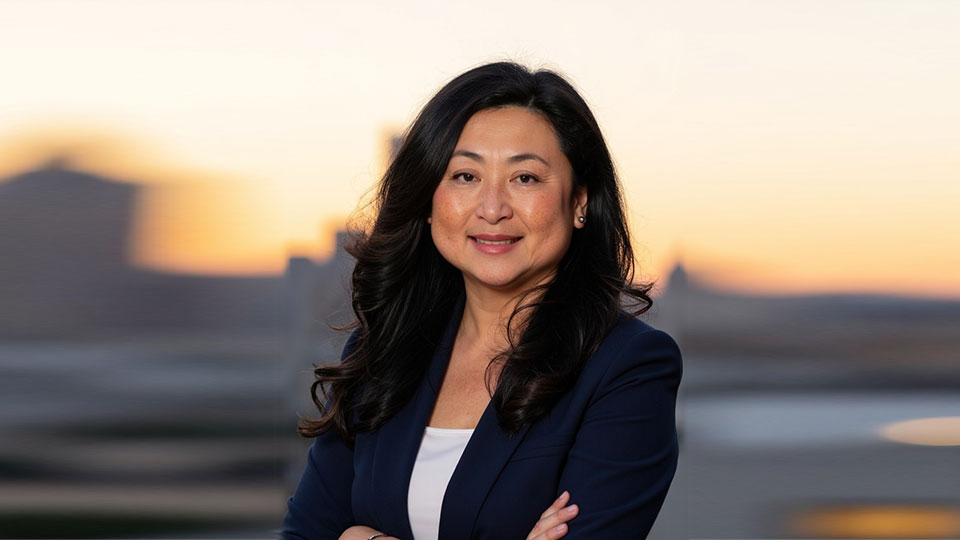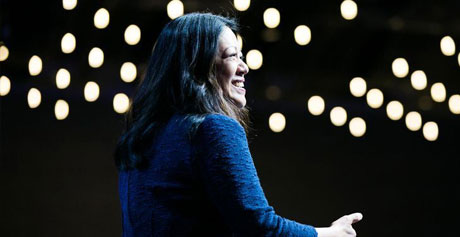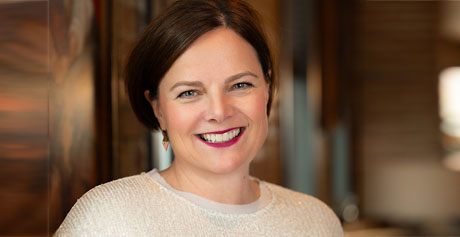Chia-Lin Simmons, CEO of LogicMark, is Leading the Charge in Personal Safety Tech, Blending Innovation with Purpose-Driven Leadership

Q: LogicMark recently conducted a survey around personal safety. What were the most compelling findings from that research?
CS: Our recent survey highlighted the challenges women face in feeling secure, offering insights into their personal safety concerns. A striking 67% of women reported feeling unsafe walking alone at night, showing a pervasive sense of vulnerability in public spaces that restricts freedom and confidence. Equally concerning, 25% of women aged 26–35 noted feeling unsafe at home alone. The fact that women don’t feel safe, even in their homes, is something we wanted to highlight as another key takeaway. Another notable finding was that 34% of women are unaware of local safety resources, pointing to a critical gap in access to tools and programs that could empower them.
These results underscore the urgent need for accessible, user-friendly safety solutions that are also discreet, so women can carry protection without drawing unwanted attention. More than 70% of women noted they preferred a discreet device. Devices like LogicMark’s Aster are not only discreet, but it also doesn’t require one to have their phone out and the app open to call for help. This kind of silent but powerful protection empowers women to act without drawing attention. Making safety tools both accessible and unobtrusive is essential for women to feel safer and more confident in their daily lives.
Q: What do you believe communities and companies can do better to address the fact that so many women are unaware of local safety resources, or don’t feel safe using them?
CS: Communities and companies can take several steps to help women feel safer. Communities can launch more visible awareness campaigns, both online and in public spaces, to ensure women know what resources are available, from self-defense classes to emergency call boxes. They can also maintain up-to-date directories of safety programs and create community-based initiatives, like neighborhood watch programs or safety workshops, that not only provide protection but also build trust and familiarity with local resources.
Companies should be thinking holistically about the safety of their employees and go beyond awareness by providing access to counseling, training, and tangible support that makes a real difference in daily life. In the same way that workplaces have invested in benefits like gym memberships or childcare services, they can also take action by offering personal safety devices, such as Aster. Tools like this empower everyone to feel more secure, whether they are at home, walking alone, or traveling, by offering an added layer of protection and peace of mind. When combining awareness initiatives with concrete resources, companies can help close the safety gap and ensure their employees have the support they need in everyday life.
Q: How is LogicMark using these findings to drive social impact and public awareness around personal security?
CS: Our survey findings have reinforced LogicMark’s commitment to empowering women and communities to feel safer every day. We use these insights to guide the development of discrete, accessible, and affordable personal safety products, like Aster, that are easy for anyone to use. Beyond products, we actively engage with communities through partnerships with running clubs, local organizations, and initiatives that advocate for underserved populations, helping to raise awareness about personal security and the resources available. By combining research-driven solutions, community engagement, and advocacy, LogicMark aims to create meaningful social impact, making personal safety a practical and achievable priority for everyone.
Q: As a woman CEO in the tech and safety space, how do you approach leadership through the lens of advocacy, especially for women and vulnerable populations?
CS: As an empathetic innovator in the technology space, I approach both product development and company leadership through an advocacy lens, particularly for women and vulnerable populations. We're not just creating technology for the sake of cool innovation—though we are having tremendous fun developing cutting-edge AI and IoT solutions—but with a deep understanding of how our users actually live their lives.
This new survey validates many things we've heard directly from women: they want and need discreet safety products that seamlessly integrate into their daily routines. Our device, Aster, reflects this understanding—it's designed to slip into a zip or clip on a hair scrunchie or fit into those impossibly small pockets that women's clothing seems to be designed with. We literally stand in the shoes of our users: women navigating their daily lives, seniors who may need additional assistance, and the women who make up the majority of family caregivers.
Our philosophy is simple: we develop technology that solves their problems rather than asking them to adapt their lives, relationships, or routines to accommodate our new technology. Our job is to deeply understand their concerns, their fears, and their desire for independence and freedom, then create solutions that deliver exactly that.
This is the reason why I joined LogicMark as CEO. The industries we occupy —medical alerts, PERS, and personal safety apps and services—haven't evolved to truly serve all the women and vulnerable populations who need these solutions. It's been a joy to build technology that makes a real impact, ensuring that we don't just hear their voices and needs as technologists and AI developers, but are fundamentally embedded in every product we create and launch.
Q: What role does innovation play in protecting women and caregivers in today’s fast-changing world?
CS: Innovation isn't just about creating the next breakthrough technology—it's about recognizing that the world is changing faster than our solutions are keeping up, especially for women and caregivers who are often juggling multiple responsibilities and facing unique vulnerabilities. When I look at how women live today—whether they're walking to their car after a late meeting, caring for aging parents while managing their own families, or simply wanting the freedom to go for a run without worry—I see a gap between their reality and the outdated, clunky products that expect them to carry separate devices or remember complex procedures in moments of crisis.
True innovation in this space means designing solutions that are as intuitive and seamlessly integrated into their lives as their smartphone, as discreet as their everyday accessories, and as reliable as the people they trust most. It's about using AI and IoT, not because they're trendy, but because they can anticipate needs, provide immediate assistance, and connect women to help without requiring them to change how they live, work, or care for others. Innovation becomes protection when it empowers women and those who worry about personal safety to maintain their independence and peace of mind without compromise.
Q: What is one word of advice you can offer to young women who want to reach your level of success?
CS: If I had to choose one word of advice for young women aspiring to leadership roles, it would be resilience. Throughout my career, I've learned that success isn't measured by how many mistakes you avoid or how much uncertainty you can sidestep it's defined by how quickly you can pick yourself up, extract valuable lessons, and move forward with renewed determination. Every setback I've encountered, whether it was a failed product launch, a strategic misstep, or navigating unprecedented market conditions, has become invaluable data that ultimately made me a stronger leader and decision-maker. The leaders who thrive are those who can embrace uncertainty as an opportunity for growth rather than a threat to be feared. When you develop that muscle of resilience, the ability to learn fast, adapt quickly, and maintain your confidence even when the path isn't clear, you'll find that what once felt like insurmountable challenges become the very experiences that prepare you for your next breakthrough.
Q: Can you tell our audience one of your most memorable moments of your career?
CS: One of my most memorable career moments happened when I was bootstrapping my AI-powered social shopping startup, Looky-loo. I found myself standing in a pawn shop on Van Ness Avenue in San Francisco, holding pieces of gold jewelry my mother had given me—not as gifts, but as what she called my security. In Taiwanese culture, gold represents love, protection, and financial stability that mothers pass to their daughters for emergencies. My mom had passed away by then, but as I stood there converting her legacy into startup capital, I realized she had become my first angel investor in the most profound way possible. It was surreal. I'm pretty sure I'm the only founder, certainly in Silicon Valley, who can say their mother's love was literally transformed into seed funding. Rather than feeling desperate, I felt completely wrapped in her encouragement and support. That moment crystallized everything about entrepreneurship for me: sometimes the greatest acts of love require the greatest leaps of faith, and the resources we need aren't always where we expect to find them. It reminded me that innovation often comes from perspectives and experiences that others haven't had—and that our unique backgrounds aren't obstacles to overcome, but advantages to leverage
Q: At the start of your career, what do you wish you had known?
CS: Looking back, I wish I had known to take even bigger leaps of faith throughout my career. Early on, I thought I was being bold. When Disney offered me an incredible position in their licensing division straight out of college, I turned it down to join an internet joint venture between MCI and News Corp instead. My parents were shocked and tried to convince me to take the 'safe' Disney role. Even though I was laid off twice within that first year during the early, volatile days of the internet—classic 'last hired, first fired' scenario—I never regretted that decision. It launched me into the tech industry I love today.
But here's what I wish I'd understood then: that leap wasn't nearly big enough. Throughout my career, I had opportunities that seemed too risky or scary—like when the NBA had the opportunity to help build their business in China. At the time, leaving my amazing role at Audible to move to a completely new country felt overwhelming and uncertain. I talked myself out of it, thinking I needed to stay focused on building my U.S.-based career. Now I realize those weren't just career opportunities, they were life-changing adventures that could have accelerated my growth exponentially. The risks that feel the most frightening are often the ones that lead to the most extraordinary outcomes. I wish I'd known that the huge leap you're afraid to take is probably exactly the one you should be taking.
Q: Can you tell us how you manage your work life balance?
CS: I'm going to be completely honest—I don't achieve perfect work-life balance, and I've stopped trying to. Someone once described it to me as having four burners on a stove, and you can realistically only tend to two or three at a time without burning something. That metaphor really resonated with me because it acknowledges the reality that high-performing professionals face.
Instead of balance, I focus on being intentionally present for what matters most. I make it to almost all of my daughter's lacrosse games and choir concerts, and when I'm there, I'm fully there—not half-distracted by my phone. But I'm also realistic: between games during a tournament, I might check emails or take a quick call. The key is being transparent with myself and my family about when I need to shift my attention.
What I've learned is that it's often the small, seemingly insignificant moments that create the deepest connections. I always volunteer to drive carpool to my daughter's games because I treasure listening to the girls get excited, hyping each other up, and yes, spill all the tea. Those conversations in the car are pure gold—you learn so much about what's really happening in their world.
With my husband, I try to carve out time for just the two of us, even if it's simple—a shared meal, a good movie, or our ongoing attempt at our little two-person book club. I'll admit I'm terrible at keeping up with the reading schedule, but some of our best conversations happen when I'm finally catching up on the book we're supposed to be discussing together. It's about creating space for connection, even when life gets messy.
Perhaps most importantly, I try to give myself grace and kindness when I don't get it right. This is challenging for so many of us, and we're all doing our best with the circumstances we have. I don't always succeed at being gentle with myself—I can be my own worst critic—but I've learned that self-compassion around work-life balance isn't just nice to have, it's essential. When we beat ourselves up for not being perfect, we're taking energy away from the very people and priorities we're trying to serve.
Q: What's your advice for women in male-dominated fields?
CS: While this advice applies broadly, I find myself sharing it especially with the college women I mentor because it never seems to occur to them how often they do this to themselves. My advice is simple: never be your first no.
So often, we talk ourselves out of opportunities before we even try—whether that's speaking up in a meeting, volunteering for a challenging project, asking for funding, or requesting a raise. That inner voice that says 'maybe I'm not ready' or 'I probably won't get it anyway'—that's us becoming our own first rejection.
Here's the reality: it's a big world full of people who are perfectly willing to tell us no, especially in male-dominated fields where our capabilities might be questioned. We know we're going to encounter skepticism and rejection. We may have to wade through countless no’s to get to a single yes. So why would we save everyone else the trouble by rejecting ourselves first?
Instead, we should be our own first, our own cheerleader, our strongest advocate for what we want to achieve. When you're operating in spaces where others might doubt your abilities, you need to be absolutely certain that you're not one of them. Give yourself permission to try, to ask, to reach for what you want. Let the world tell you no if it's going to—but don't you dare be the first in line to do it.
The worst thing that can happen is you'll get the same no you would have gotten anyway. But the best thing that can happen is you'll surprise yourself with what's actually possible when you lead with your own belief in yourself.
Five Things About Chia-Lin Simmons
1. What’s your favorite thing to do in your free time?
I know it probably sounds generic, but I love drinking tea with a book and/or having afternoon tea. Ideally, I am either having afternoon tea with friends or family or curled up on the couch with a very good book, accompanied by a cup of Fortnum & Mason or Mariage Freres tea and something savory to nibble on, like unlimited tea sandwiches from The Savoy in London and a slice of Victoria Sponge cake. I have a treasured memory of a European work trip where I had a weekend in London, and I was able to have all-you-can-eat tea sandwiches and Victoria Sponge and amazingly fragrant tea by the teapot while I read a historical novel. I like to do more of that if I have more free time!
2. What’s your favorite quote or saying?
“This isn’t the Field of Dreams - If you build it, they will come! It’s technology! No matter how good your product is, you still need marketing and sales!”
3. What is your favorite game or sport to watch and play?
We are a lacrosse family - my daughter and my husband both know how to play. There’s been a lot of playing lacrosse, coaching lacrosse, and watching lacrosse in our family! That said, we have also started getting into watching some ice hockey and women’s basketball (college and WNBA).
4. Would you rather cook or order in?
This is an easy question! For those who know me, the answer is obvious—I am an order-in girl! I'm a horrible cook, but I'm blessed to have married someone who is a good cook. When he's out or traveling for work, my daughter and I use DoorDash!
5. Cake or pie?
My first instinct is to say BOTH! But the reality is that I probably love cakes more. I have two cakes that I dream about! The best cake in the world is the Signature Coconut Cake from the Halekulani Hotel in Oahu, Hawaii. I dream of this cake. When I used to serve on the board of an international company that was headquartered in Hawaii, I would fly in and out of the island in 24-48 hours for work. Despite being packed with meetings, I would always carve out a quick one-hour visit before leaving just to grab a slice, have a glass of iced tea, and watch the surf. I've tried to figure out how to get this cake shipped to me, but it's too delicate and wouldn't travel well, so it's impossible!
I just have to make my way back to Oahu soon for another slice. As a substitute—though not an easy one to get either—I love the King's Hawaiian Bakery and Restaurant Guava Chiffon Cake. When I have time visiting family in LA or traveling there for work, I try to drop by for a slice. One of the nicest things my best friend ever did for me was bring back an entire Guava cake when she was in LA for work and surprise me with it when she visited me in the Bay Area. This wasn't easy for her to pull off—the cake that required refrigeration and had to be hand-carried, which is no simple feat when you're traveling for work and then flying to visit someone. That's the kind of BFF everyone should have!

